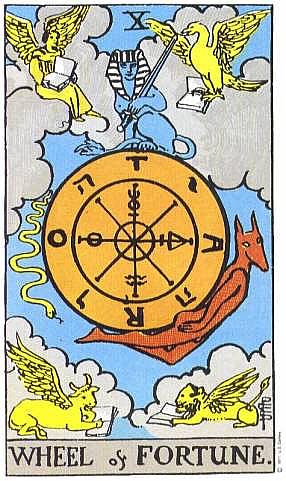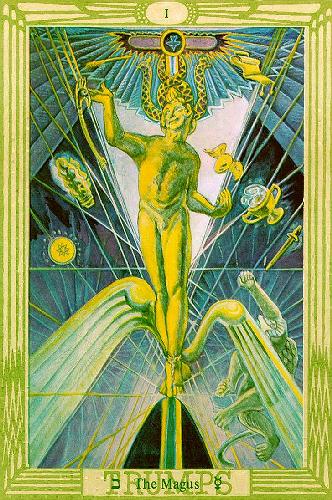
|
"At the corners of this Tarot are the mystical animals mentioned in the Bible
(Ezekiel 1:10, Revelation 4:7). They correspond to the fixed signs of the
zodiac: the bull to Taurus; the lion to Leo; the eagle to Scorpio; the man or
angel to Aquarius.
They typify unchanging reality in relation to the ever-turning wheel. That
which was, is, and ever shall be remains the same; rotation of events goes on
within it. The laws of cause and effect are always operative.
The evolution of consciousness from lower forms to higher is represented by the
jackal-headed Egyptian God, Hermes-Anubis, while on the left side of the wheel
the serpent of cosmic energy flows into form.
The Sphinx is the equilibrating principle, the eternal self of man behind the
veil of personality. The word TARO is interspersed around the wheel with the
alchemical signs for mercury (above), sulphur (right), salt (left), and
Aquarius, symbol of water (dissolution), below.
- Wheel of Fortune
"Crowley and Case associate the three upper stations of the Wheel with the
three alchemical principles and with the three Gunas of Hindu philosophy.
Mercury is on our left (Fortuna's right), Sulphur on the top, and Salt on the
right. Mercury is associated with the Guna called Sattva, which Case and
Crowley explain as consciousness, intelligence and balance; it corresponds to
Jung's Thinking function. Sulphur is associated with Rajas, representing
passion, activity, restlessness and brilliance; it corresponds to Jung's
Feeling function. Salt is associated with Tamas, representing stability,
inertia and ignorance, which might be identified with Jung's Sensation.
- The Pythagorean Tarot by John Opsopaus
|
 The Juggler tarot card (more commonly known as The Magician card):
The Juggler tarot card (more commonly known as The Magician card):























 Arachnophilia
Arachnophilia